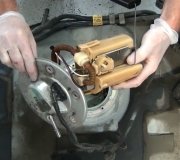If the fuel pump assembly came from the dealer, it's a complete assembly with the sending unit and float. If it came from somewhere else, they usually only provide the pump and motor which must be installed into the housing. Less expensive parts; much more time involved so total cost is about the same.
What on earth is the logic in replacing a fuel pump for a gauge problem? That's like putting a cast on my leg for a toothache! The only explanation I could think of that makes sense is, based on the mileage, your mechanic wants to save you from having problems later, or it sounds noisy and he's afraid of being blamed if it fails in the near future. He could be protecting himself from the "ever since" syndrome. "Ever since you changed my oil, the power antenna doesn't work; what are you going to do about it"? Electric fuel pumps do give a lot more problems than the mechanical ones from decades ago. They are much more expensive, and they take a long time to replace. That could be why your mechanic thinks it makes sense to replace it now while it's already out of the tank.
Is this a new problem or has it done this ever since you've owned it? The reason I'm asking is someone may have previously replaced the pump assembly. When installing the assembly, it is fairly easy to hook the float and bend the arm, causing the sensor contact to ride too high. Without having a new float, it's just a trial and error process of bending the arm and trying it. A competent do-it-yourselfer can do this, but it must be noted that the pump assembly is held in with a giant threaded plastic nut, about 6" or 7" in diameter. The ring and the tank have arrows molded in them that must line up exactly when the nut is tightened sufficiently. If the arrows are off by an inch, fuel leakage will occur when the tank is filled.
To bend the float arm, it does not have to be removed from the sending unit, however, as long as you're in there, you might as well address a very common problem with a simple fix. One little white plastic finger holds the float arm from falling off its mounting pin. If you lift that finger, you can slide the arm off. Near the pivot end you'll see the two brass contacts. Bend them just a little so they make increased pressure on the black sensor element, then snap the arm back on. Weak pressure is the cause of the gauge reading correctly from full to half tank, then dropping to "empty" until you reach 1/4 tank at which time the gauge will read correctly again. Fairly common problem with an easy, cheap fix. On older vehicles, the clue was the "Low Fuel" light did not come on because that second contact was still working. By the late 1990s, however, the warning light is turned on by the instrument cluster, which is a computer module in itself. It monitors the fuel gauge, not that second contact in the fuel level sender. What this means is due to having another unnecessary, over-complicated computer, we've lost a simple diagnostic clue. This is also why I'm sticking to my 1988 Grand Caravan. No computers!
Caradiodoc
SPONSORED LINKS
Sunday, March 22nd, 2009 AT 9:03 PM



